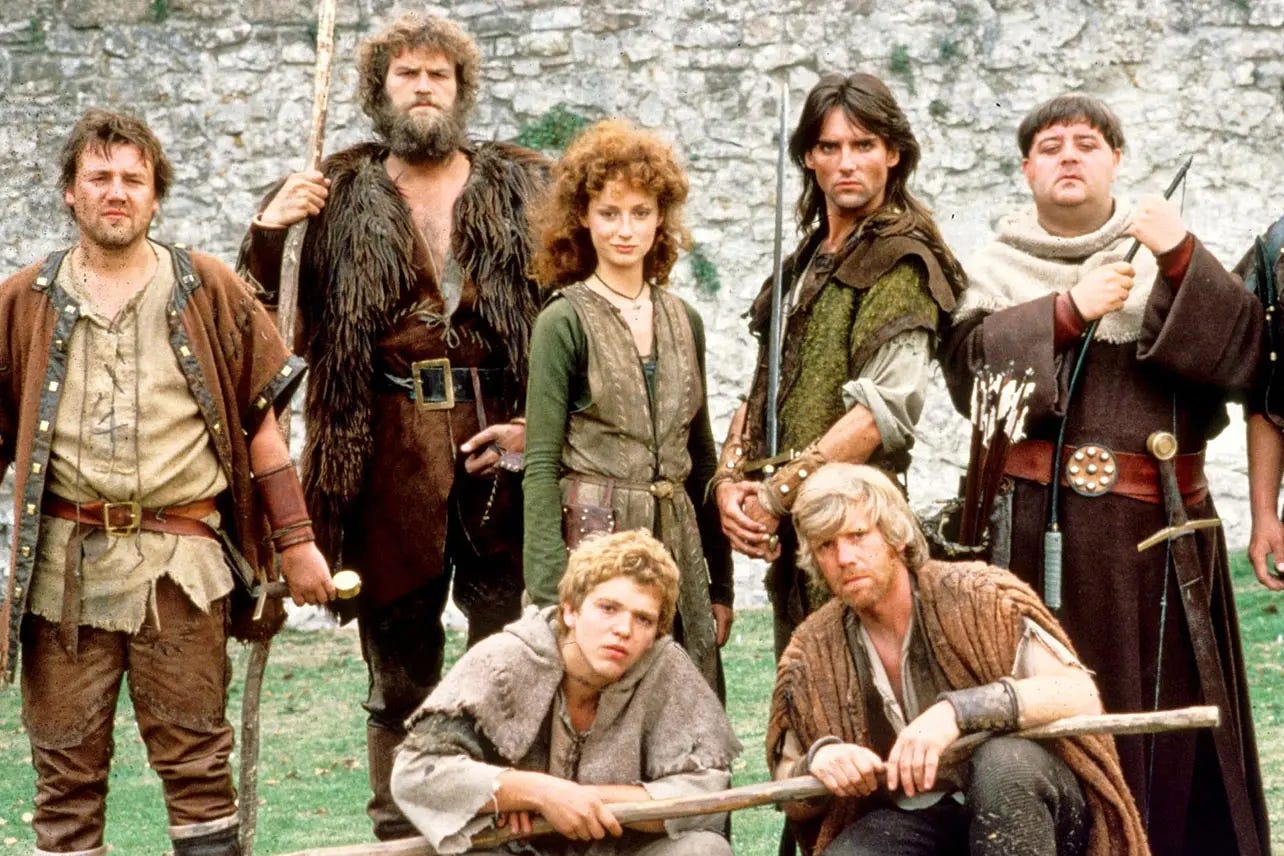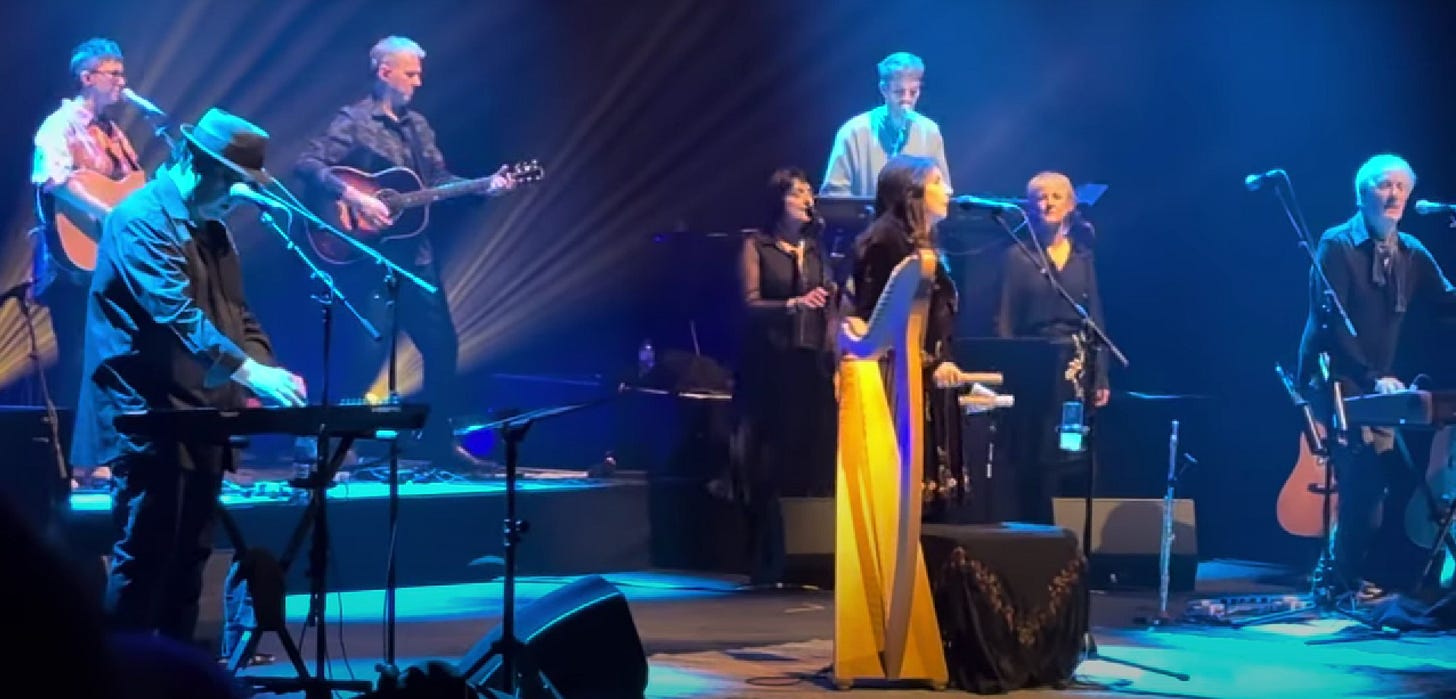Earlier this month we were lucky enough to see Clannad play once again. We last saw them in 2021, not that long after I had taken redundancy and started up as a freelance learning designer. It was also around the time that the latest round of climate negotiations were taking place in Glasgow. At the time those negotiations were billed as a last chance to keep the world under 1.5c. Well, we all now know how that played out! Not very well! Just three years later scientists are calling 1.5c dead in the water!
Soon afterwards, I wrote a newsletter where I talked about my despondency around climate change policy (or lack of), and referred to a quote from the 1980’s Robin of Sherwood TV show. For those of you old enough to remember you might recall that Clannad provided the soundtrack for that series, which was a key part of what made it a success (and helped to launch Clannad into stardom).
You might be asking now what Clannad, an old TV show about an English legend, and climate change policy has to do with each other. The connection between the first two I’ve just explained, but the connection to climate change is less obvious. Robin of Sherwood was a political show. It highlighted questions about power, class struggle, and what it meant to be English, at a time when Margaret Thatchers Conservative government were destroying the coal mining communities and attempting to enact an extremely unfair Poll Tax. In doing so it also called back to simpler times of becoming more self-sufficient, relying more on community, and connecting back to nature. It also promoted a pre-Christian idea of faith, based on the remnants of paganism through the main characters worshiping and offering their allegiance to Herne the Hunter.
The mythology doesn’t stand up to historical accuracy, of course. Herne the Hunter is a much later invention, and one more associated with Windsor Forest in Berkshire, than Nottingham or Yorkshire. It doesn’t matter. The show painted a clear picture of an oppressed culture hidden in the depths of old England, and more connected to the soil of the country, than their Norman oppressors. Of course, this was all offered through a pair of rose-tinted spectacles!
When I wrote that newsletter I suggested that climate change policy is a type of class struggle, but very different to that experienced in the 1980’s. This is more a struggle over our future, and those who are poorest suffer the effects most, while the effects are mostly created by those who are wealthiest. Even Boris Johnson (the then Prime Minister) recognised that solutions to the climate crisis had to be at international State level, although he failed entirely to do that much about it.
This is a class struggle of a different type. This is a struggle over the future. The challenge, is what to do about it as individuals? One of the rallying cries in Robin of Sherwood has stayed with us since we started to re-watch the show. After an encounter with Herne, Robin wakes his new friends and tells them:
“You were sleeping. You’ve slept too long – we all have. It’s time we woke. It’s time we stopped running.”
Robin wasn’t talking about a morning lay-in of course, he was making the case that we are blindly allowing those with the power to run and ruin what matters, usually so that they can fill their own pockets and fuel their superiority complexes. That, and a lot of greenwashing, is what I see as happening at Cop29. Nothing much good will come from there, but a lot of harm might. Those with the power have totally corrupted what was once, a genuine attempt to tackle such a gigantic problem as climate change.
That brings us back to what we, as individuals can do. For some the answer is protest. There’s no doubt that protest groups such as Extinction Rebellion and Greta Thunberg’s Friday’s for Future protests managed to make some headway. Then Covid got in the way and the world changed. I’ve yet to see similar success since and, besides, protest is not for me.
Protest and rebellion is what Robin was suggesting though when he made his speech about sleeping too long. As the series progressed, they became quite competent at it as outlaws in Sherwood Forest. There are other ways to protest though, and one of them is by being the change that you want to see and then talking about it. Side Stepping Normal is part of that for us. It’s a process not an end-goal. We will never feel as if we have managed to become perfect ecological neutral people, if that’s even a term. But its the attempt that matters and ultimately, it’s all that we can do, unless we have ways to directly influence those with the power.
Some final thoughts
Clannad’s final performance was the show we saw. It was ironically held in a place that exudes power and wealth, the Royal Albert Hall in London. It’s an amazing building and well-worth a visit if you can. Like most places in Britain its connections to royalty and power are laid bare in every inch of its architecture, but its business operations attempt to open it up much wider.
Alongside the songs and music, they managed to rustle up guest appearances. The two actors who played Robin in the TV Show, Michael Praed and Jason Connery introduced the band, and half way through more of the actors appeared, including Nickolas Grace (who excellently played the Sheriff of Nottingham) lording over us from one of the royal boxes.
When the music started I was reminded of the messages from the TV show, and the ideals of a freer and simpler life, one opposed to the excesses that has got us into this mess. It’s a reminder, I felt, that all we can do is our best and to always keep in mind the bigger questions of what we are doing, why we are doing it, and how it might harm others or the world itself. So, now is the time to stop sleeping. Now is the time to wake up. Now is the time to stop running. Now is the time to be our better selves and save our world for ourselves, as those in power have absolutely refused to do it!





